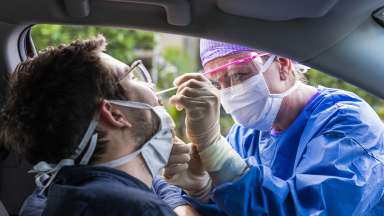Jump To:
Occasionally, the amount of disease in a community rises above the expected level. Epidemic refers to an increase, often sudden, in the number of cases of a disease above what is normally expected in that population in that area. Pandemic refers to an epidemic that has spread over several countries or continents, usually affecting a large number of people.
Risks of a disease epidemic
- Widespread illness
- Depending on severity, public spaces such as schools may be closed
- Travel and mobility limitations
Pandemics happen when new viruses emerge, which can infect people easily and spread from person to person in an efficient and sustained way. Because the virus is new to humans, very few people will have immunity against the pandemic virus and a vaccine might not be widely available. The new virus will make a lot of people sick. Smaller or more localized outbreaks of disease can also be caused by bacteria (e.g. Legionnaire’s Disease or cholera).
How sick people get will depend on:
- the characteristics of the virus or bacterium;
- whether or not people have any immunity to that virus; and,
- the health and age of the person being infected.
During a disease epidemic, pay close attention to the news and advice from medical personnel on how individual diseases are spread and take recommended preventative and protective measures.
Before a disease epidemic
- Store a two-week supply of water and food.
- Periodically check your regular prescription drugs to ensure a continuous supply in your home.
- Have any nonprescription drugs and other health supplies on hand, including pain relievers, stomach remedies, cough and cold medicines, and fluids with electrolytes and vitamins.
- Get copies and maintain electronic versions of health records from doctors, hospitals, pharmacies, and other sources and store them for personal reference. Get help accessing electronic health records.
- Talk with family members and loved ones about how they would be cared for if they got sick, or what will be needed to care for them in your home.
- Prepare for how you and your household will deal with the closures of schools and other public spaces.
Everyday preventative actions
- Practice good personal health habits to help prevent the spread of disease.
- Stay home when you are sick. Stay home for at least 24 hours after you no longer have a fever or signs of a fever without the use of fever-reducing medicines.
- Cover your coughs and sneezes with a tissue.
- Wash your hands often with soap and water for at least 20 seconds. Use at least a 60-percent alcohol-based hand sanitizer if soap and water are not available.
- Clean frequently touched surfaces and objects.
During a disease epidemic
- Limit the spread of germs and prevent infection.
- Avoid close contact with people who are sick.
- When you are sick, keep your distance from others to protect them from getting sick, too.
- Cover your mouth and nose with a tissue when coughing or sneezing. It may prevent those around you from getting sick.
- Washing your hands often will help protect you from germs.
- Avoid touching your eyes, nose, or mouth.
- Practice other good health habits. Get plenty of sleep, be physically active, manage your stress, drink plenty of fluids, and eat nutritious food.
- If you or someone in your household is sick, stay home and ensure that they seek proper medical attention.
Resources
Centers for Disease Control (CDC) Health Alert Network (HAN) shares information about urgent public health incidents. You can sign up to receive these email updates here:
NC Department of Health and Human Services coordinates the State-wide response and provides up-to-date information about disease outbreaks and available resources in NC.
